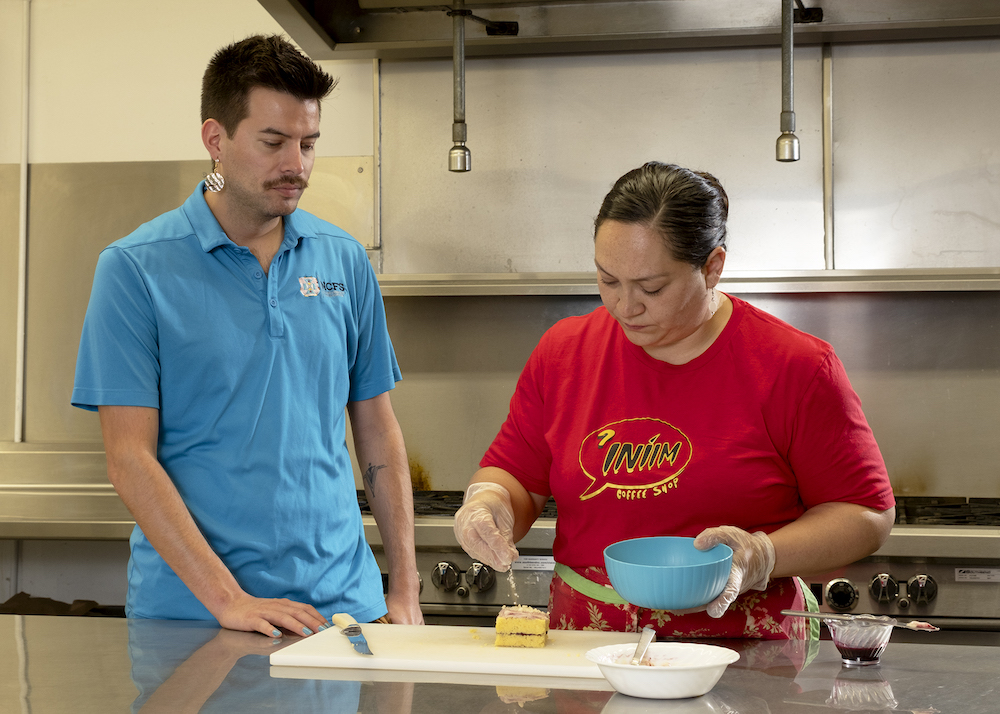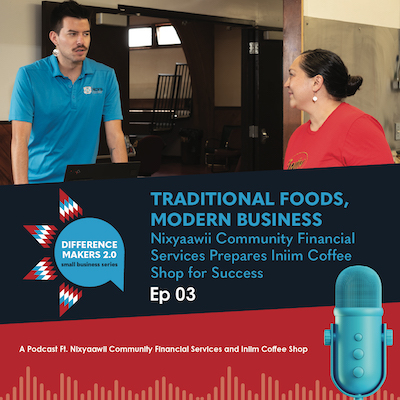
- Details
- By Tribal Business Content Studio
- Sponsored Content
During the early days of the COVID-19 pandemic, Sadie Mildenberger, a citizen of the Umatilla Tribe, daydreamed about owning a business centered around the traditional foods that she loved.
“I was thinking of all the ways I could work without going back to work,” Mildenberger said. “I love cooking, gathering and serving food.”
While she had the passion and drive, Mildenberger was intimidated by her lack of business experience. At her sister's insistence, she connected with Nixyaawii Community Financial Services. The Native CDFI is a tribally owned nonprofit offering homeownership assistance, business development services, and financial education to tribal citizens and non-tribal residents on the Umatilla Indian Reservation in Pendleton, Ore. The community has a population of 3,500 and the reservation spans 271 square miles on the north side of the Blue Ridge Mountain Range.
Mildenberger started taking advantage of one-on-one small business counseling and classes at Nixyaawii to help her envision her business and put together her plan.
“As soon as I started participating in the opportunities from Nixyaawii, everything started to grow and develop,” Mildenberger said.
 Nixyaawii Business Services Manager Jacob Wallis, also an Umatilla citizen, said he recognized the potential community impact of Mildenberger's idea to serve innovative dishes crafted from traditional foods.
Nixyaawii Business Services Manager Jacob Wallis, also an Umatilla citizen, said he recognized the potential community impact of Mildenberger's idea to serve innovative dishes crafted from traditional foods.
“The community impact was really easy to see,” Wallis said. “Most families are mixed or have lost traditions because of colonization and the potential impact of COVID and the loss of elders. To have someone who can provide that education while also integrating the taste into modern menus is fighting fire with fire in a way.”
As a young Native CDFI, Nixyaawii aims to equip entrepreneurs like Mildenberger with the skills and capital needed to thrive and create something brand new in the community.
Nixyaawii became a certified Native CDFI in 2022. They have six entrepreneurs in their lending pipeline and are on track to close their first small-business loan this summer.
“What has never existed on our reservation is a small-business ecosystem,” Wallis said. “Our entire intent is to build that ecosystem. We have entrepreneurs in our community, they are just doing it at their kitchen tables, as opposed to in a brick-and-mortar building.”
Nixyaawii would prove to be critical in helping Mildenberger build her confidence to take on entrepreneurship. Gradually, through one-on-one small business counseling and classes at Nixyaawii, she created a business plan and readied her business for launch.
Wallis said that Mildenberger’s perseverance through her self-doubt and her persistence in showing up is what Nixyaawii looks for in their small business clients.
"She was actively wanting to do it and showing up, she was taking the classes, making progress in business readiness, and those are the things we really want to see," Wallis said.
In 2022, Mildenberger began catering events in the community, serving dishes that are innovative on traditional ingredients, like elderberry muffins, bison meatloaf and lamprey pâté with a balsamic glaze. The experience, she said, was a crash course that helped her business skills evolve little by little with each event.
“There is a lot of pressure there, catering to important groups, committees and (tribal) council — it does help you grow,” she said. “Every time I learned a little bit more about how to do it better, and then I would touch base with Nixyaawii and they would tell me what my next logical step was.”
After a year of catering, a coffee shop space opened up at the Nixyaawii Governance Center. Wallis knew it was the perfect opportunity for Midlenberger to learn the ropes of running a brick-and-mortar business. She opened Iniim Cafe in 2023 and brought the recipes she perfected into a rotating menu. She hired her first employee through a tribal workforce program.
For Mildenberger, seeing her customers fall in love with traditional foods through modern dishes was deeply gratifying.
“Those things make me so proud,” she said. “I’m really really happy when someone who has never liked one of our traditional foods has something of ours and they’re like, ‘Oh, I didn’t know you could do it this way!’”
While the cafe was a success, running a brick-and-mortar location meant Mildenberger had less time to build the parts of her business that were important to her, like gathering traditional ingredients. Today, Mildenberger is working alongside Nixyaawii to enter the Native CDFI’s lending pipeline so she can transform Iniim into a food truck. The truck would have a spot at a future food truck park the Native CDFI is building out next to its office.
Support from Nixyaawii has been crucial to Mildenberger pivoting her vision, and step-by-step building the business of her dreams with her culture at the center.
“The brick-and-mortar spot was a perfect incubator for her,” Wallis said. “It helped her figure out what she really wanted to do without accruing a massive debt. It’s absolutely OK to pivot.”
For her part, Mildenberger is ready to take the next step in her business. She’s grateful to Wallis and Nixyaawii for helping her get to this point.
“Everything I know is because I started at zero, and they baby-stepped me through,” Mildenberger said. “I was able to wrap my head around this daydream I was having by walking through all these steps they set out for me.”
Difference Makers 2.0 is a new yearlong series that highlights how Native community development financial institutions (CDFIs) work alongside their small business clients to accelerate change and create economic opportunities in Native communities. Join the Native CDFI Network and Tribal Business News as they shine a spotlight on the people accelerating economic change in Indian Country. Read the stories here and be sure to tune into the Difference Makers 2.0 podcast.